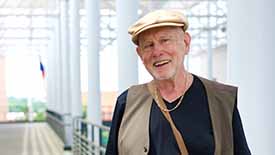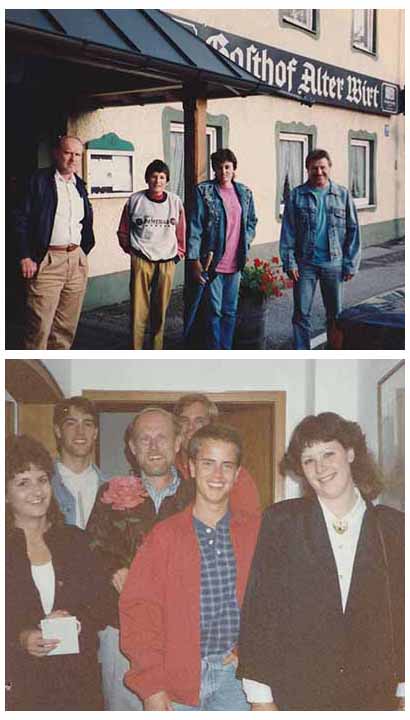After a half century, Robert Reimer bids ‘Auf Wiedersehen’ to Charlotte

Commencement can signify a beginning for faculty members much like it does for graduating students. This fall, it does so for Robert Reimer, who will retire and start a new life chapter after 53 years at UNC Charlotte as a professor of German and film studies.
Reimer arrived in fall 1971 shortly after completing a master’s degree and a Ph.D. in German language and literature from the University of Kansas. A native of Milwaukee, he had earned his undergraduate degree from the University of Wisconsin-Madison.
Describing the city of his childhood as an ethnic enclave, he recounts that his paternal grandparents immigrated from Germany and his maternal grandparents from Poland in the late 1800s. Neither of Reimer’s parents spoke English until they were teenagers and needed to get jobs.
“Nevertheless my father identified as an American and insisted we learn English,” said Reimer. “He wouldn’t speak German with his children and preferred that my mother not speak Polish in the house. But knowing my family’s roots were in Germany prompted my desire to learn more about the language and culture.”
Marriage and a move to Charlotte
In Madison, Reimer was introduced to his future wife, Carol Jaeger, at a campus party by a fraternity brother who insisted Robert meet “this wild dancer.” After discovering they’d attended the same large Milwaukee high school but never crossed paths, the couple dated casually until Robert was in a major accident that required a six-week hospital stay.
“A woman I was dating more seriously at the time came to see me maybe once,” said Reimer. “But my best friend and Carol visited almost every day to keep me company and help lift my spirits. It sort of clicked, and we married right after graduation before moving to Kansas.”
Eschewing a large wedding, the couple used money from Carol’s parents to travel Europe for 11 weeks, staying at pensions or similar affordable lodgings.
Back in the U.S. for graduate studies, the Reimers made Kansas their home for the next six years, except for a year in Stuttgart, Germany, before relocating to Charlotte to begin their careers in earnest — Robert Reimer as a tenure-track assistant professor, and Carol Reimer, with a Master of Library Science, eventually joining the staff of Atkins Library.
Establishing a teaching career
Reimer — alongside Susan Cernyak, Karl Gabriel, Chuck Merrill and William Park — was among the first five Charlotte faculty members who specialized in teaching German language and culture.
“We were virtually inseparable,” said Reimer, who witnessed a fledgling university with an enrollment of less than 5,000 become the doctoral-granting research institution of today with more than 30,000 students.
Early on, the quad around today’s Belk Plaza was the center of campus, with the surrounding areas heavily wooded. For years, Reimer traversed the forests with fellow faculty members.
“It was unbelievable to go into the woods and run our hearts out. All our department chairs knew not to schedule 11 a.m. meetings for us,” he said, marveling at the expansion of campus. “Now, activity centers around Popp Martin Student Union, and it’s amazing to see the life and activity in the union with the bulk of classrooms behind the library.”
Taking advantage of opportunities
It didn’t take long for Reimer to indulge his love of film by adding German drama courses to the curriculum. He used an eight-month leave in 1980 to switch his research area from German drama to German film, which won him a Fulbright grant to teach film in Germany where he and his wife began researching their first book, “Nazi-Retro Film: How Postwar Germany Remembers the Past.”
 As a Fulbright professor at the Paedigogische Hochschule (University of Education) for the 1984-85 academic year, he immersed himself in German cinema, reading and writing about film and attending film conferences. Inspired, when he returned to Charlotte, he collaborated with several colleagues to establish the Film Studies program, for which he was founding director, in 1992. Other overseas appointments included faculty exchanges with University of Stuttgart in 1996 and 2005 and the Université de Limoges from 2013-15. He also served as director of the UNC Charlotte program at the University of Kingston from 2002-03.
As a Fulbright professor at the Paedigogische Hochschule (University of Education) for the 1984-85 academic year, he immersed himself in German cinema, reading and writing about film and attending film conferences. Inspired, when he returned to Charlotte, he collaborated with several colleagues to establish the Film Studies program, for which he was founding director, in 1992. Other overseas appointments included faculty exchanges with University of Stuttgart in 1996 and 2005 and the Université de Limoges from 2013-15. He also served as director of the UNC Charlotte program at the University of Kingston from 2002-03.
German film is the subject of five of Reimer’s six books; currently, he and Carol are revising the sixth, “Historical Dictionary of Holocaust Cinema.”
“The Nazis disrupted German cinema, and it remained a mess until the 1960s when various directors established New German Cinema. The country regained its reputation for film excellence and became the envy of other nations as the German government subsidized production, which resulted in many great art films,” said Reimer.
So, what are Reimer’s must-see German films? Heading the list are an older picture from the 1970s “Fear Eats the Soul” and the more recent “Transit.”
“There are so many films produced internationally. Between Europe and Hollywood alone, thousands of films are released each year, so who can see them all?” asked Reimer, who regularly attends the Berlin Film Festival and for years was on the board of directors for the Charlotte Film Society.
Students across the decades
During his five-decade career, Reimer has taught thousands of students. He’s watched the evolution of hairstyles and clothing styles, but the University’s commitment to providing access to higher education stands out as a constant.
“Charlotte has always been a first-generation institution with serious students who are concerned about obtaining their degrees to improve their career prospects,” said Reimer. “I remember early on a lot of my students came with the intent to transfer elsewhere. But we have become a destination institution; we’re no longer a fallback school.
He describes today’s students as bright as ever and as qualified as they were earlier in his career. He recognizes that they are searching for their purpose through higher education, just as he did as a first-generation undergraduate.
“Some of my film students are unbelievable; they will write about a musical score and offer perspectives that I had not considered,” Reimer stated. “Today’s generation is just as intelligent as previous ones. But I do have trouble relating to their smartphone addiction. They seemingly have to be constantly connected.”
Reflections upon career highlights
Reimer hopes to be remembered for starting the Film Studies program. He also takes pride in helping to establish the German Language Immersion Program at Bruns Elementary and for his years as chair of the Department of Languages and Culture Studies.
He also was a founding member of Alemannia, a Queen City German language cultural association and served more than two decades on the board of the Charlotte Film Society. In addition, he raised funds to create the Cernyak, Gabriel, Reimer Scholarship to assist German majors.
Often, individuals near the end of their careers claim their lives unfolded exactly as they planned. Not Robert Reimer. “Your whole life is accidental. Virtually everything I did unwittingly benefitted my life and career,” he said. “Wherever we went, Carol and I took advantage of opportunities to further our careers and, in all honesty, to just enjoy our lives.”